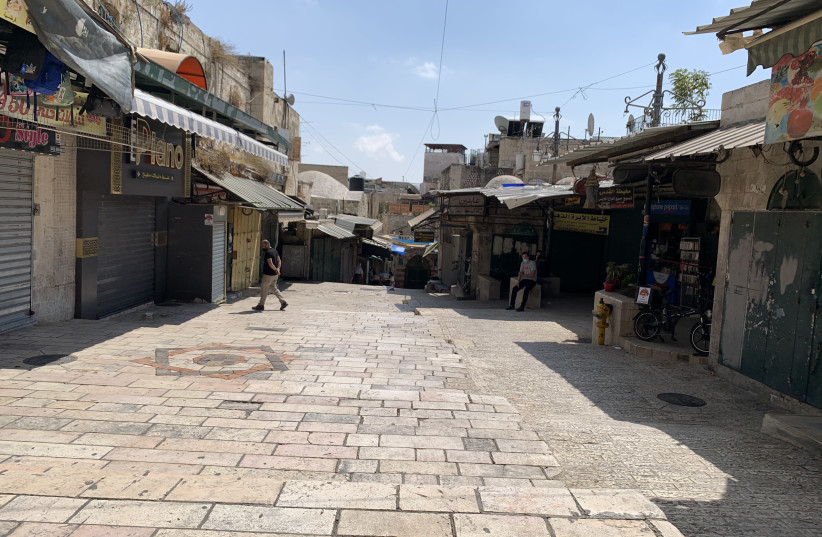As the holy Muslim month of Ramadan approaches, the usual mood of joy and celebration is missing from east Jerusalem. Markets in the Holy City should be bustling with people stocking up for the holiday, but instead, the streets are quiet.
For more stories from The Media Line, go to themedialine.org.
Palestinian merchants and residents have warned that any Israeli restriction on access to al-Aqsa Mosque compound will lead to an escalation in violence—but it will also hit their pockets.
The Old City’s economy relies heavily on Israel’s Palestinian citizens visiting in large numbers. Israel’s efforts to block them from entering the city will have major security and economic ramifications.
Ever since Hamas’ October 7 attacks on Israel, Palestinians from the West Bank have now been almost entirely barred from entering Jerusalem.
Hijazi Al-Rishq, secretary of the Arab Chamber of Commerce in East Jerusalem, told The Media Line that the city’s merchants are exhausted financially and can’t handle another prolonged financial catastrophe.

“East Jerusalem has emerged from the COVID-19 pandemic crisis, which lasted for two years and was a major blow to the city’s urban sector. The merchants barely started to get out of that hole, only to face the war’s effect,” said Al-Rishq.
Highlighting the significant negative impact this war has had on Palestinian businesses, Al-Rishq continued: “This war has led to severe repercussions for the commercial situation in the city of Jerusalem. First, the Old City was closed entirely for 45 days at the beginning of the war.
“Outside the Old City, there are oppressive measures, including barriers and preventing people from entering the city, affecting its commercial activity.”
The war has hit the tourism sector particularly hard, “directly affecting the income of many city residents who work in this sector,” he concluded.
Palestinian merchants in the city usually look forward to a sales boom ahead of Ramadan, a time for reflection, prayer, family, and charity as thousands of people converge on the Holy City to pray at Al-Aqsa Mosque.
This year is different from all previous years
But this year is different.
“Every year, we prepare for Ramadan as this is a holy and spiritual city. But Ramadan will be very sad this year,” Hazem Abu Najib, an east Jerusalem clothing store owner, told The Media Line.
According to Abu Najib, the threat of Israel imposing restrictions on Palestinians’ entry into the city and access to Al-Aqsa Mosque is driving people away. “This affects the economy of the Holy City,” he said.
Abu Najib’s clothing store is on Salah Edin Street, East Jerusalem’s main commercial street. His shop is a fixture here, usually packed with young shoppers seeking the latest men’s fashion. However, he says he spends most of his time reading the newspaper.
“This war has had a huge impact on the Holy City,” he said.
One of the main entrances to the Old City, Damascus Gate, whose amphitheater-style plaza is a popular spot for Palestinians to meet, especially after iftar (the fast-breaking evening meal), looks empty these days.
In past years, when Ramadan was approaching, festive decorations adorned houses and buildings, including colorful lights and lanterns.
“Unfortunately, there is no demand for Ramadan decorations this year,” Iyad Dendis, another Old City merchant, told The Media Line. All merchants are suffering. Preparations for this season have occurred for several months, and there is no demand. We sell at lower prices just to compensate for the loss.”
Many Palestinians in east Jerusalem say any kind of celebration and joy is unacceptable while their people are starving in Gaza under Israel’s brutal campaign.
The war in Gaza has cast a dark cloud over Ramadan celebrations, according to Um Ahmad, a resident of the east Jerusalem neighborhood, Shu'afat.
“I bought one set of lights only for inside our home. My kids wanted them. Otherwise, I wasn’t planning on decorating this year because of the war,” Um Ahmad told The Media Line.
Other residents echoed this sentiment, telling the Media Line that they wouldn’t be decorating for Ramadan this year either. “We have made a decision not to decorate and place lights and lanterns to celebrate and rejoice in the holy month of Ramadan due to the war on our people in the Gaza Strip,” said resident Ammar Sidr.
This should be one of the busiest times of the year, with Ramadan around the corner. Usually, these ancient alleyways and shops are incredibly busy, full of shoppers stocking up for the month. But if you speak to any shop owners, they say that sales have plummeted.
“Sales during Ramadan usually provide shop owners with desperately needed injections of cash that equals three months of income,” financial analyst Fadel Tahboub told The Media Line. However, this year, expecting a slow season, shop owners resorted to offering special prices to attract customers.
Even sweets like knafeh, usually a fixture on tables during the holy month, aren’t selling. Adnan Jaafar, who owns one of the oldest sweet shops in the city, told The Media Line that he hadn’t bought as much stock as he usually does this year for fear of not having much business.
“Preparations are lighter than any previous year because of the political situation and war, which plays a major role in this issue,” Jaafar said.
